第一讲:一般将来时
一般将来时讲解

一般将来时讲解一般将来时:一、一般将来时的定义:一般将来时表示将来某一时刻的动作或状态,或将来某一段时间内经常的动作或状态。
常常和表示将来的时间状语连用。
如:tomorrow〔明天〕,next week〔下周〕;in the future〔将来〕等。
一般将来时由助动词shall〔第一人称〕,will 〔第二、三人称〕动词原形构成。
美式英语那么不管什么人称,一律用will。
或用主语+be动词+ going to 动词.二、一般将来时表示方法:1.用will或shall表示“助动词will或shall+动词原形〞这一形式,表示将来发生的事情,用于征求对方的意见或表示客气的邀请。
在口语中will用于所有人称,书面语中第一人称常用shall【其实will也可以用到】。
如:①Tomorrow will be Sunday. 明天就是星期天。
②The rain will stop soon. 雨很快就要停了。
③Shall we go there at five? 我们五点钟去那儿?4④Will you please open the door? 请你把门翻开?2.用be going to构造表示"be going to+动词原形〞用来表示事先考虑过的将要发生的动作以及已有迹象说明必将要发生的某事〔有一个前兆〕,意为“打算;就要〞。
如:①We're going to meet outside the school gate. 我们打算在校门口见面。
②Look! It's going to rain. 瞧!快下雨了。
3.用如今进展时表示表示位置转移的动词〔如:go, come, leave, start, arrive等〕,可用如今进展时4.表示将来时。
如:①Uncle Wang is coming. 王叔叔就要来了。
②They're leaving for Beijing. 他们即将前往北京。
语法之一般将来时

特殊疑问句(Wh-/How question): Wh-/How +shall/will+ v原+主语?
What will you do tomorrow?
I will do my homework.
Will you leave here tomorrow?----No, I won’t.
Doe----
-----Then will you invite ---Yes.
(invite, you) her? -
6. ----What are you going to do (do, you) this evening? ----I am going to have family. (have) dinner with my
in an hour(一小时后),in twenty years(二十年后)
The vegetables will be mature(成熟的) in ten minutes. E. 其他。In 2050, soon, in future London will hold the 30th Olympic Games in 2012.
肯定:主语+will/shall+ v原+其他。 否定:主语+ will not (won’t)/shall not (shan’t) +v原+其他。 一般疑问句(yes/ no question):
Shall/Will+ 主语+v原+其他?
Yes, 主语+will/shall. No, 主语+shall not/won’t.
初中一般将来时讲解
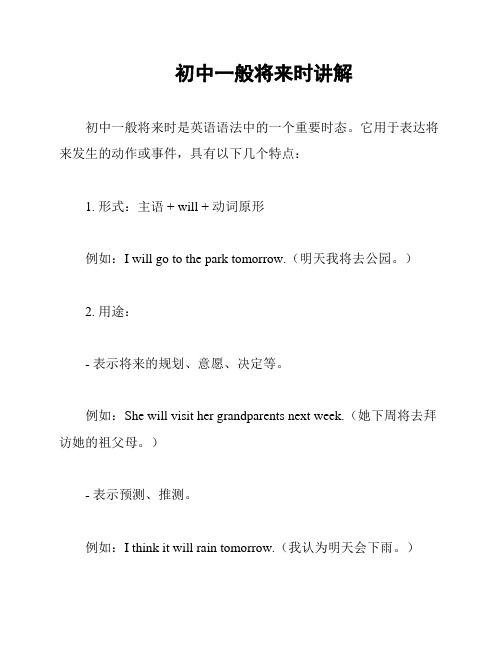
初中一般将来时讲解初中一般将来时是英语语法中的一个重要时态。
它用于表达将来发生的动作或事件,具有以下几个特点:1. 形式:主语 + will + 动词原形例如:I will go to the park tomorrow.(明天我将去公园。
)2. 用途:- 表示将来的规划、意愿、决定等。
例如:She will visit her grandparents next week.(她下周将去拜访她的祖父母。
)- 表示预测、推测。
例如:I think it will rain tomorrow.(我认为明天会下雨。
)- 用于官方通知、邀请、警告等场合。
例如:The school will hold a party next month.(学校下个月将举办一次聚会。
)- 用于做出决定或提供帮助。
例如:I will help you with your homework.(我将帮助你完成作业。
)3. 注意事项:- 表示将来的时间状语词一般使用,如tomorrow(明天)、next week(下周)等。
- 一般将来时常与表示将来的时间状语词或时间状语从句一起使用。
- 对于第一人称(I)和第二人称(you)的陈述句,可以使用缩略形式:I'll, you'll。
4. 示例:- She will go to the cinema this evening.- They will have a picnic in the park.- We will study Spanish next semester.- He will go on vacation next month.总之,初中一般将来时是英语语法中的重要时态,可以表达将来发生的动作或事件,同时也可以用于表示意愿、决定、预测等场合。
掌握这一时态的用法有助于学生加深对英语语法的理解。
一般将来时PPT课件

•一般将来时基本概念•一般将来时结构与用法•一般将来时时间状语及标志词•一般将来时与其他时态对比•一般将来时在各类从句中运用•一般将来时误区及注意事项•总结回顾与拓展延伸目录01一般将来时基本概念定义与特点定义特点表现形式will + 动词原形be going to + 动词原形现在进行时表示将来预测未来计划与安排条件与假设030201使用场景02一般将来时结构与用法主语+ be not going to + 动词原形+ 其他成分主语+ be to not (非标准用法,尽量避免使用) + 动词原形+ 其他成分主语+ will not (won't) + 动词原形+ 其他成分Will + 主语+ 动词原形+ 其他成分?Be + 主语+ going to + 动词原形+ 其他成分?Be + 主语+ to + 动词原形+其他成分?(较少使用,多用于书面语)特殊疑问词动词原形特殊疑问词going to +成分?特殊疑问词to +(较少使用,多用于书面语)注意:在一般将来时的使用中,要注意区分不同语境和表达方式的细微差别,选择合适的结构进行表达。
同时,也要注意与其他时态的区分和联系,避免混淆使用。
特殊疑问句结构03一般将来时时间状语及标志词常见时间状语表示将来的时间状语表示计划或安排的时间状语标志词识别与运用04一般将来时与其他时态对比与现在进行时对比时间指向不同01动词形式差异02使用情境不同03时间基准差异动词形式变化使用情境区别时间范围不同动词形式区别使用情境差异05一般将来时在各类从句中运用在宾语从句中运用01 02定语从句的时态取决于它所修饰的先行词,如果先行词是将来时态,定语从句也使用将来时态。
如果先行词是过去将来时,定语从句则使用过去将来时。
定语从句中表示将来的时间状语有:tomorrow, next year, in the future 等。
06一般将来时误区及注意事项误区二过度使用“will”和“going to”。
一般将来时知识点

一般将来时知识点一般将来时是英语中常用的一种时态,用来表示将来发生的动作或状态。
在句子中,一般将来时通常由助动词"will"或"shall"加动词原形构成。
除了表示将来的动作或状态外,一般将来时还可以表示决心、意图、预测、承诺以及请求等不同的语义。
下面是一些一般将来时的知识点:1.一般将来时的基本结构:主语 + will/shall + 动词原形+ …例如:- I will visit my grandparents tomorrow.(我明天会去看望我的祖父母。
)- He shall help you with the project.(他会帮助你完成这个项目。
)2.一般将来时的否定形式:主语 + will not/shall not + 动词原形+ …例如:- They will not arrive on time.(他们不会准时到达。
)- She shall not attend the meeting.(她不会参加会议。
)3.一般将来时的疑问形式:将助动词"will"或"shall"提前到句子的主语之前,并且将句末的问号加在句子结束处。
例如:- Will you come to the party?(你会来参加聚会吗?)- Shall we go for a walk?(我们去散步好吗?)4.一般将来时与时间状语的搭配:一般将来时经常和表示将来时间的状语词或短语一起使用,如:tomorrow(明天)、next week(下周)、in the future(在未来)等。
例如:- We will have a meeting tomorrow.(我们明天有个会议。
)- She shall complete the report next week.(她下周会完成这份报告。
)5.一般将来时表示打算、意图:一般将来时也经常用来表示打算、意图或计划要做某事。
一般将来时ppt课件

02 一般将来时的基本用法
表示将来要发生的行为
要点一
常见的助动词“will”和 “shall”可以用于表示将…
“I will go to the store tomorrow.”(我明天要去商店。 )
要点二
“be going to”也可以用于表达 将来要发生的行…
“It is going to rain later.”(待会儿要下雨了。)
肯定句
I am going to swim in the afternoon.
否定句
They are not going to watch the movie.
疑问句
Are you going to meet your friend tomorrow?
主语+be to+动词原形
肯定句
You are to hand in your homework tomorrow.
表示邀请或建议
总结词
表示邀请或建议某人做某事,通常用于 口语交流中。
VS
详细描述
在口语交流中,我们经常使用一般将来时 态来表示邀请或建议,例如:“Would you like to come to my house for dinner tomorrow?”(明天你想来我家 吃晚饭吗?)或者“Let's go for a walk after dinner.”(晚饭后我们去散步吧。 )
02
在一些情况下,我们也可以使用“be going to”来表达将来时
。例如
It is going to rain.(将要下雨了。)
03
构成
They are going to graduate next year.(他们将于明年毕业。)
一般将来时

一般将来时:表示将来某个时间(相对于讲话时间)将要发生或存在的状态,也表示将来的一段时间内经常或反复发生的动作,常与表示将来的时间连用,如下:tomorrow 明天the next time 下一次the day after tomorrow 后天next week 下周next year 明年tomorrow evening 明天晚上in the future 将来Iater(on)以后before long 不久后其基本句型如下:(一)will: will+动词原形,可以用于第一,第二,第三人称及其复数(不分人称)。
<1>陈述句肯定句:主语+ will + 动词原形(+将来的时间或地点). 否定句:主语+won't + 动词原形(+将来的时间或地点)例句:I will play the pia no at the con cert.我将要在音乐会上弹钢琴。
I won't go to school tomorrow.我明天不上学。
<2>特殊疑问句特殊疑问词+w i l l +人称+动原+将来的时间?答句:人称+will+动词原形.例句:What will you be in the year 2050? 2050 年你将会成为什么?I will be a doctor我将会成为一个医生。
<3>一般疑问句Will+人称+动词原形(+将来的时间或地点)?答句:Yes人称+will. No,人称+won't.例句:Will you visit your grandparents this Saturday? 这周六你是否去拜访你的爷爷奶奶?Yes, I will.(二) shall:shall+动词原形,只能用于第一人称的单复数(I, we)<1>陈述句肯定句:l/We shall +动词原形(+将来的时间或地点)。
我/我们将要… 否定句:I/We shall not + 动词原形(+将来的时间或地点)。
一般将来时知识点
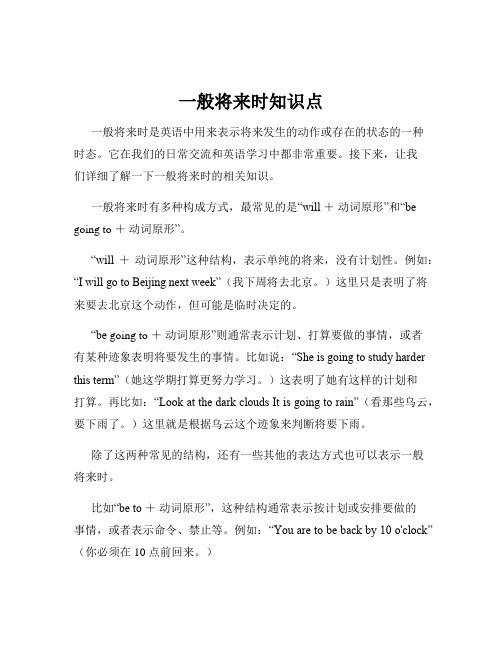
一般将来时知识点一般将来时是英语中用来表示将来发生的动作或存在的状态的一种时态。
它在我们的日常交流和英语学习中都非常重要。
接下来,让我们详细了解一下一般将来时的相关知识。
一般将来时有多种构成方式,最常见的是“will +动词原形”和“be going to +动词原形”。
“will +动词原形”这种结构,表示单纯的将来,没有计划性。
例如:“I will go to Beijing next week”(我下周将去北京。
)这里只是表明了将来要去北京这个动作,但可能是临时决定的。
“be going to +动词原形”则通常表示计划、打算要做的事情,或者有某种迹象表明将要发生的事情。
比如说:“She is going to study harder this term”(她这学期打算更努力学习。
)这表明了她有这样的计划和打算。
再比如:“Look at the dark clouds It is going to rain”(看那些乌云,要下雨了。
)这里就是根据乌云这个迹象来判断将要下雨。
除了这两种常见的结构,还有一些其他的表达方式也可以表示一般将来时。
比如“be to +动词原形”,这种结构通常表示按计划或安排要做的事情,或者表示命令、禁止等。
例如:“You are to be back by 10 o'clock”(你必须在 10 点前回来。
)“be about to +动词原形”表示即将发生的动作,通常不与具体的时间状语连用。
例如:“The film is about to start”(电影即将开始。
)在使用一般将来时的时候,要注意时间状语的搭配。
常见的时间状语有:tomorrow(明天)、next week(下周)、in the future(在未来)、soon(很快)等等。
另外,一般将来时的否定形式和疑问形式也有一定的规律。
“will +动词原形”的否定形式是“will not(won't)+动词原形”,疑问形式是把“will”提到主语前面。
一般将来时
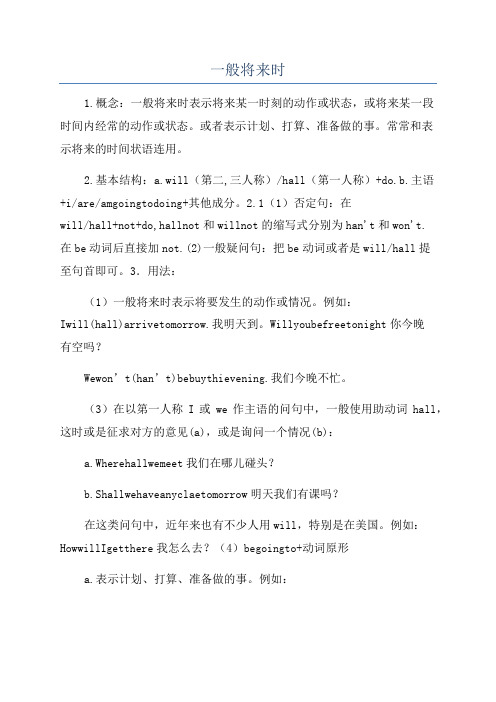
一般将来时1.概念:一般将来时表示将来某一时刻的动作或状态,或将来某一段时间内经常的动作或状态。
或者表示计划、打算、准备做的事。
常常和表示将来的时间状语连用。
2.基本结构:a.will(第二,三人称)/hall(第一人称)+do.b.主语+i/are/amgoingtodoing+其他成分。
2.1(1)否定句:在will/hall+not+do,hallnot和willnot的缩写式分别为han't和won't.在be动词后直接加not.(2)一般疑问句:把be动词或者是will/hall提至句首即可。
3.用法:(1)一般将来时表示将要发生的动作或情况。
例如:Iwill(hall)arrivetomorrow.我明天到。
Willyoubefreetonight你今晚有空吗?Wewon’t(han’t)bebuythievening.我们今晚不忙。
(3)在以第一人称I或we作主语的问句中,一般使用助动词hall,这时或是征求对方的意见(a),或是询问一个情况(b):a.Wherehallwemeet我们在哪儿碰头?b.Shallwehaveanyclaetomorrow明天我们有课吗?在这类问句中,近年来也有不少人用will,特别是在美国。
例如:HowwillIgetthere我怎么去?(4)begoingto+动词原形a.表示计划、打算、准备做的事。
例如:Wearegoingtoputupabuildinghere.我们打算在这里盖一座楼。
Howareyougoingtopendyourholiday假期你准备怎样过?b.表示即将发生或肯定要发生的事。
例如:Ithinkitigoingtonow.我看要下雪了。
(5)用一般现在时表示将来的情况。
在主从复合句中,当主句为一般将来时时,在if,aoona,until,when等引导的状语从句中用一般现在时代替一般将来时。
如:Ifitdoen’trainthiafternoon,we’llhaveaf ootballmatch.如果今天下午不下雨,我们将进行一场足球比赛。
(完整版)一般将来时讲义

一般将来时1.一般将来时的基本概念一般将来时表示将来某一时刻的动作或状态,或将来某一段时间内经常的动作或状态。
一般将来时由助动词shall(第一人称),will(第二、三人称)+动词原形构成。
美国英语则不管什么人称,一律用will.2.一般将来时的形式●will 常简略为 'll,并与主语连写在一起,如:I’ll,he'll,it'll,we’ll,you'll,they’ll。
●一般疑问句如用will you…?其简略答语须是Yes,I will或 No,I will not;如用 Shall you…?(较少见)其简略答语须是 Yes,I shall.或 No, I shall not.。
3.一般将来时的用法1)表示将来的动作或状态一般将来时常与一些表示将来的时间状语连用,如:tomorrow(明天), next week(下周), from now on(从现在开始);in the future(将来)等.2)表示将来经常发生的动作。
4.一般将来时的其他用法一般将来时表示将来某一时刻的动作或状态,其表达形式除了“shall(第一人称),will(第二、三人称)+动词原形构成”外,还有以下几种形式.1)“to be going to+动词原形”表示即将发生的或最近打算进行的事.例如:①It is going to rain。
要下雨了。
②We are going to have a meeting today. 今天我们开会。
2)go, come,start,move,sail,leave,arrive,stay等可用进行时态表示按计划即将发生的动作,例如:I'm leaving for Beijing。
我要去北京.3)“be to+动词原形”表示按计划要发生的事或征求对方意见。
例如:①Are we to go on with this work?我们继续干吗?②The boy is to go to school tomorrow.这个男孩明天要去上学。
一般将来时定义,结构,标志词,用法,变化规则
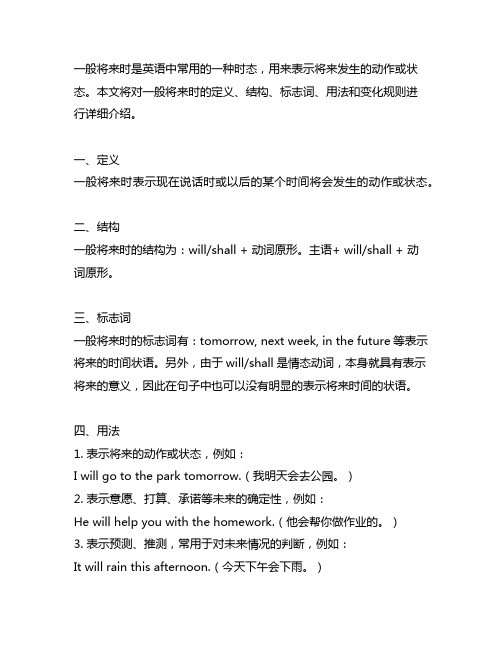
一般将来时是英语中常用的一种时态,用来表示将来发生的动作或状态。
本文将对一般将来时的定义、结构、标志词、用法和变化规则进行详细介绍。
一、定义一般将来时表示现在说话时或以后的某个时间将会发生的动作或状态。
二、结构一般将来时的结构为:will/shall + 动词原形。
主语+ will/shall + 动词原形。
三、标志词一般将来时的标志词有:tomorrow, next week, in the future等表示将来的时间状语。
另外,由于will/shall是情态动词,本身就具有表示将来的意义,因此在句子中也可以没有明显的表示将来时间的状语。
四、用法1. 表示将来的动作或状态,例如:I will go to the park tomorrow.(我明天会去公园。
)2. 表示意愿、打算、承诺等未来的确定性,例如:He will help you with the homework.(他会帮你做作业的。
)3. 表示预测、推测,常用于对未来情况的判断,例如:It will rain this afternoon.(今天下午会下雨。
)五、变化规则1. 肯定句的一般将来时结构为:will/shall + 动词原形。
例如:She wille to see me tomorrow.(她明天会来看我。
)2. 否定句的一般将来时结构为:will/shall + not + 动词原形。
例如:I will not go to the party tonight.(我今晚不会去参加派对。
)3. 疑问句的一般将来时结构为:will/shall + 主语+ 动词原形。
例如:Will youe to the meeting tomorrow?(你明天会来参加会议吗?)以上就是关于一般将来时的定义、结构、标志词、用法和变化规则的详细介绍。
希望对您有所帮助。
一般将来时是英语中最常用的一种时态之一,用于表示将来会发生的动作或状态。
2024版高中一般将来时PPT课件图文

表示客观必然性
有些情况下,一般将来时 可以表示客观必然性,如 The sun will rise tomorrow.
05 练习题及答案解 析
填空题专项训练
根据句意和所给汉语 提示,填写正确的动 词形式。
根据语境和时态提示, 填入正确的动词形式, 完成句子。
用所给动词的适当形 式填空,使句子意思 完整、通顺。
计划和打算
一般将来时也可以用于表达个人的计划、打算或安排,例如:They will arrive at the airport at 9:00.(他们将于9点到达机场。)
条件和可能性表达
条件状语从句
在if或unless等引导的条件状语从句中,主句用一般将来时,从 句用一般现在时表示将来,例如:If it doesn't rain tomorrow, we will go for a picnic.(如果明天不下雨,我们就去野餐。)
礼貌原则在跨文化交际中应用
尊重对方文化
01
在跨文化交际中,应尊重对方的文化背景和习惯,避免使用可
能引起误解或冲突的未来表达方式。
谨慎承诺
02
在不确定能否履行承诺的情况下,应谨慎使用过于确定的未来
表达方式,以免造成不必要的误解或压力。
适时调整
03
根据交际的进展和对方的反馈,适时调整自己的未来表达方式,
或存在的状态。
否定句
主语 + will/shall + not + 动词原 形,表示将来某个时间不会发生的 动作或不存在的状态。
疑问句
Will/Shall + 主语 + 动词原形,用 于询问将来某个时间是否要发生某 个动作或存在某个状态。
一般将来时课件

相关语法点拓展
be going to结构
表示计划、打算或预测将要发生的动作,可与will互换使用。如:I am going to visit my grandparents next week. 我下周打算去看望我的祖父母。
现在进行时表将来
某些动词的现在进行时可以表示按计划或安排将要发生的动作,这类动词有come, go, leave, arrive等。如:We are leaving for Beijing tomorrow. 我们明天动身去北京。
例句2
She is going to buy a new car after she gets her salary.(她发工资后打算买一辆新车。)
分析
主句使用了“be going to”结构表示将来的打算,从 句使用了现在时“gets”,表示将来的某个时间点。
例句3
They are to meet at the school gate before the bell rings.(他们将在铃响前在学校门口集合。)
分析
主句使用了“be to”结构表示按计划将要发生的动作 ,从句使用了现在时“rings”,表示将来的某个时间 点。
04
条件状语从句与主句配合
条件状语从句引导词
01
02
03
04
if
表示某个条件,意为“如果” 。
unless
表示某个条件不成立,意为“ 除非”。
as long as
表示某个条件一直满足,意为 “只要”。
一般将来时的特殊疑问句
特殊疑问词 + will + 主语 + 动词 原形 + 其他?
易错难点剖析
will后接动词原形,而不是动词 的过去式或现在分词。
一般将来时小学ppt课件
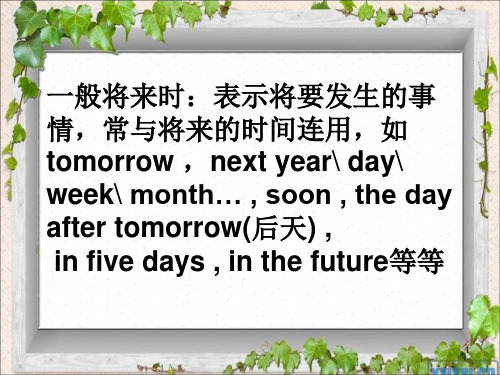
肯定句 :主语 + be ( am, is, are ) + going to + 动词原形 +其他.
I’m going to go there next month. 下个月我将去那里。 He is going to visit his grandparents next year. 明年他将要去看望他的爷爷奶奶。 They are going to find a new house to live in. 他们将要找一所新房子住。
7
三、用现在进行时表示。 经营者提供商品或者服务有欺诈行为的,应当按照消费者的要求增加赔偿其受到的损失,增加赔偿的金额为消费者购买商品的价款或接受服务的费用 表示位置转移的动词(如:go, come, leave, start, arrive等), 可用现在进行时表示将来时。如:
1. Uncle Wang is coming. 王叔叔就要来了。 2. They're leaving for Beijing. 他们即将前往北京。
否定句 : 主语 + be ( am, is, are ) + not + going to + 动词原形 +其他.
He isn’t going to see the movie. 他不会去看电影。 You aren’t going to work on the farm this weekend. 这个周末你们不去家场劳动。 We aren’t going to have a meeting this afternoon. 今天下午我们不开会。
一般疑问句:Will + 主语+动词原形+其他?
一般将来时课件.上课用

缩写形式的一般疑问句
总结词
表示询问对方或第三方的行为或意愿,常用于口语或非正式场合。
详细描述
一般将来时的缩写疑问句形式为“'ll+动词原形”,例如“You'll come, won't you?”。这种形式常用于口语或 非正式场合,表示对对方行为的询问和推测。
特殊疑问句形式
总结词
表示询问具体信息,常用于询问某个具 体的时间、地点、人物等。
常见形式
基本形式
主语 + will + 动词原形,例如“I will go to the park tomorrow”。
进行形式
主语 + will be + 现在分词,例如 “She will be studying in the library this afternoon”。
完成形式
主语 + will have + 过去分词,例 如“They will have finished their work by the end of the week”。
例如:We won’t be late. (我们不会迟 到。)
用于口语或非正式场 合,更加简洁。
缩写形式
“won’t”是“will not”的缩写形 式,除了“won’t”外,还有其他常 用的缩写形式,如“shan’t”、 “needn’t”等。
在使用缩写形式时,需要注意语法和 语境的正确性,避免产生歧义或误解 。
02
一般将来时的用法
表示未来的计划和打算
计划和打算
一般将来时用于表示未来的计划和打 算,例如“我明天要去北京旅游”、 “我们下周要召开一个会议”等。
时安排
在描述时间安排时,一般将来时也经 常被使用,例如“明天下午三点有个 会议”、“下周五晚上有个聚会”等 。
英语一般将来时讲解

英语一般将来时讲解1.句型结构①助动词will / shall + 动词原形一般将来时表示将来要发生的动作或存在的状态,常与表示将来的时间状语tomorrow,next time,in the future,in+时间段,soon等连用,其结构为“will/shall+动词原形”。
其中will可用于各种人称;shall主要用于第一人称的句子中,尤其是在疑问句中,当主语为第一人称时,通常用shall。
例如They will go swimming tomorrow.Where shall we go for our holidays?②be going to+动词原形“be going to+动词原形”表示将要发生的动作或安排、打算,或有某种迹象表明即将发生某事。
③其他可表示将来的时态:(1)现在进行时可表示计划或准备要做的事;(2)一般现在时可表示按计划要发生的事。
例如:The Smiths are going shopping tomorrow.The final bus leaves at 7:00 p.m.2.一般疑问句: Will + 主语 + 其他?肯定句:Yes , 主语 + will.否定句: No, 主语 + won’t.例如:Will they have more time?肯定句: Yes, they will.否定句: No, they won’t.6. there be句型的一般将来时: There will be ……表示“将有……”。
例如:There will be more cars in the future.3. there 句型的肯否定句there be是原形;表示某处有某物there will be、there is going to be是there be句型一般将来时的表现形式。
例如:There is going to be a concert tomorrow.There are going to be two new zoos built next week.肯定句:There + will be + 其他否定句: There + won't be. + 其他一般疑问句:Will + there+ be + 其他?回答:Yes, there will. / No, there won’t. 例如:There will be more food.。
- 1、下载文档前请自行甄别文档内容的完整性,平台不提供额外的编辑、内容补充、找答案等附加服务。
- 2、"仅部分预览"的文档,不可在线预览部分如存在完整性等问题,可反馈申请退款(可完整预览的文档不适用该条件!)。
- 3、如文档侵犯您的权益,请联系客服反馈,我们会尽快为您处理(人工客服工作时间:9:00-18:30)。
第一讲:.一般将来时一般将来时的构成:由助动词shall或will加动词原形构成,shall用于第一人称。
在口语中,will在名词或代词后常简略为’ll,will not常简略为won’t。
这个时态的肯定,否定和疑问结构可表示如下:用”be going to +动词原形”也可表示将来时,表示将要发生的事,打算或决定要做的事。
一般将来时的用法:1)表示将要发生的动作或情况;2)不以人的意志为转移,肯定要发生的事情。
The day after tomorrow will be National Day.后天是国庆日。
一般将来时练习构成:will /shall + 动词原形( shall :用于第一人称)will not = won’t表将来时时间:tomorrow/next week/ month/year, the day after tomorrow, in the future, this Sunday, in five days一般将来时练习题选择题( ) 1. There __________ a meeting tomorrow afternoon.A. will be going toB. will going to beC. is going to beD. will go to be( ) 2. Charlie ________ here next month.A. isn’t workingB. doesn’t workingC. isn’t going to workingD. won’t work( ) 3. He ________ very busy this week, he ________ free next week.A. will be; isB. is; isC. will be; will beD. is; will be( ) 4. There ________ a dolphin show in the zoo tomorrow evening.A. wasB. is going to haveC. will haveD. is going to be( ) 5. –________ you ________ free tomorrow?– No. I ________ free the day after tomorrow.A. Are; going to; willB. Are; going to be; willC. Are; going to; will beD. Are; going to be; will be( ) 6. Mother ________ me a nice present on my next birthday.A. will givesB. will giveC. givesD. give( ) 7. – Shall I buy a cup of tea for you?–________. (不,不要。
)A. No, you won’t.B. No, you aren’t.C. No, please don’t.D. No, please.( ) 8. – Where is the morning paper?– I ________ if for you at once.C. to getD. will get( ) 9. ________ a concert next Saturday?A. There will beB. Will there beC. There can beD. There are( ) 10. If they come, we ________ a meeting.A. haveB. will haveC. hadD. would have( ) 11. He ________ her a beautiful hat on her next birthday.A. givesB. gaveC. will givingD. is going to giving( ) 12. He ________ to us as soon as he gets there.A. writesB. has writtenC. will writeD. wrote( ) 13. He ________ in three days.A. coming backB. came backC. will come backD. is going to coming back( ) 14. If it ________ tomorrow, we’ll go roller-skating.A. isn’t rainB. won’t rainC. doesn’t rainD. doesn’t fine( ) 15. – Will his parents go to see the Terra Cotta Warriors tomorrow?– No, ________ (不去).A. they willn’t.B. they won’t.C. they aren’t.D. they don’t.( ) 16. Who ________ we ________ swimming with tomorrow afternoon?A. will; goB. do; goC. will; goingD. shall; go( ) 17. We ________ the work this way next time.A. doB. will doC. going to doD. will doing( ) 18. Tomorrow he ________ a kite in the open air first, and then ________ boating in the park.A. will fly; will goB. will fly; goesC. is going to fly; will goesD. flies; will go( ) 19. The day after tomorrow they ________ a volleyball match.A. will watchingB. watchesC. is watchingD. is going to watch( ) 20. There ________ a birthday party this Sunday.A. shall beB. will beC. shall going to beD. will going to be( ) 21. They ________ an English evening next Sunday.A. are havingB. are going to haveC. will havingD. is going to have( ) 22. ________ you ________ free next Sunday?A. Will; areB. Will; be( ) 23. He ________ there at ten tomorrow morning.A. willB. isC. will beD. be( ) 24. ________ your brother ________ a magazine from the library?A. Are; going to borrowB. Is; going to borrowC. Will; borrowsD. Are; going to borrows( ) 25. – Shall I come again tomorrow afternoon?–________ (好的).A. Yes, pleaseB. Yes, you will.C. No, please.D. No, you won’t.( ) 26. It ________ the year of the horse next year.A. is going to beB. is going toC. will beD. will is( ) 27. ________ open the window?A. Will you pleaseB. Please will youC. You pleaseD. Do you( ) 28. –Let’s go out to play football, shall we?– OK. I ________.A. will comingB. be going to comeC. comeD. am coming( ) 29. It ________ us a long time to learn English well.A. takesB. will takeC. spendsD. will spend( ) 30. The train ________ at 11.A. going to arriveB. will be arriveC. is going toD. is arriving填空题1.We (_______buy) him a pen for his birthday next week.2.I _______ (call)you when I get there.3.Linda _______ _______ (not eat)chocolates any more.4 _______I _______ (begin)to play computer games?5.If it is sunny tomorrow, we _______ (have)a picnic outside.6.I _______ (tell)him the news when I see him at the office.7.There_______ _______ (not be)a football match next month.8. _______ he_______ (give)a talk on “Works of art”next Friday?No, he _______. He ______ (visit) the Palace Museum.9. Where______Tom_______ (go) the day after tomorrow?10. She ________ (not go) swimming this weekend.答案:1. C2. D3. D4.D5. D6. B7. C8. D9. B 10. B 11. D 12. C 13. C 14. C 15. B 16. D17. B 18. A 19. D 20. B 21. B 22. B 23. C 24. B25. A 26. A 27. A 28. D 29. B 30. D。
